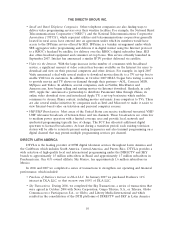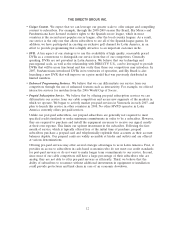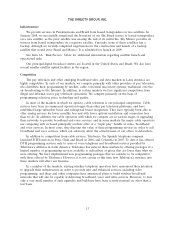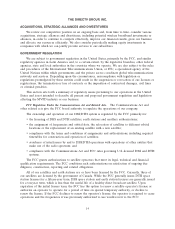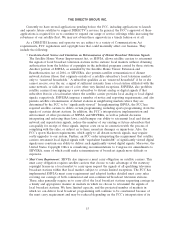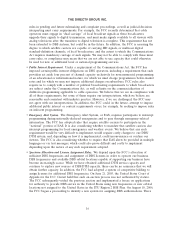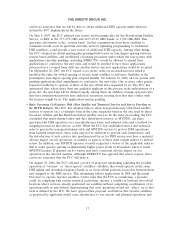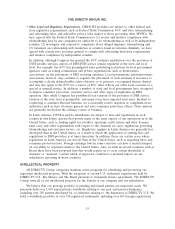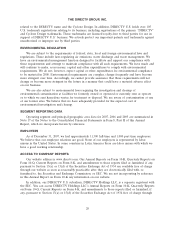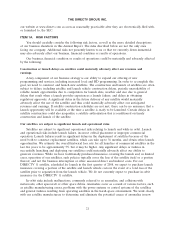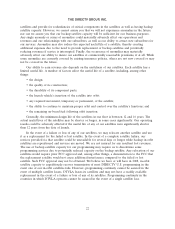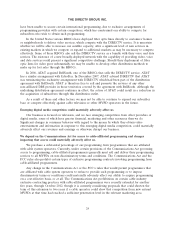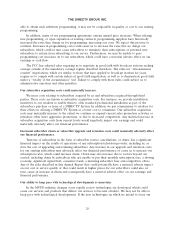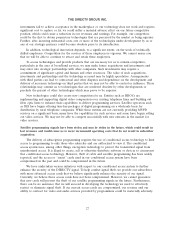DIRECTV 2007 Annual Report Download - page 27
Download and view the complete annual report
Please find page 27 of the 2007 DIRECTV annual report below. You can navigate through the pages in the report by either clicking on the pages listed below, or by using the keyword search tool below to find specific information within the annual report.THE DIRECTV GROUP, INC.
impose a significant constraint on the further growth of our DIRECTV U.S. DBS service. We
cannot predict what if any action the FCC may take or the effect of such a proceeding on our
business.
On November 29, 2006, despite the pendency of the tweener satellite rulemaking and over
DIRECTV’s opposition, the FCC’s International Bureau granted Spectrum Five’s application to
operate a tweener satellite at the 114.5o WL orbital location, only 4.5o away from DIRECTV’s
DBS satellites operating at the 110o WL and 119o WL orbital locations. While the Bureau
limited Spectrum Five’s operations to levels below those at which the ITU deems one DBS
system to ‘‘affect’’ another in the absence of agreement from all affected DBS operators
(including us), the Bureau’s grant of Spectrum Five’s application prior to coordination could
ultimately permit Spectrum Five to operate at levels that would cause interference to our
operations. We have sought review of the Bureau’s order by the full FCC.
The FCC also recently adopted rules that require satellite operators to take certain measures to
mitigate the dangers of collision and orbital debris. Among other things, these rules impose
certain requirements for satellite design and end-of-life disposal maneuvers for all satellites
launched after March 18, 2002, which apply to seven of our in-orbit satellites. We believe that
we are in compliance with all of these requirements and expect that we will continue to be able
to comply with them going forward, but the requirements for end-of-life disposal could result in
a slight reduction in the operational life of each new satellite.
•Geographic Service Rules. The FCC requires DBS licensees to comply with certain geographic
service obligations intended to foster the provision of DBS service to subscribers residing in the
states of Alaska and Hawaii. We believe that we are in compliance with these rules, but the
State of Hawaii has filed a petition for administrative sanctions against us taking a contrary view,
and urging the FCC to take enforcement action against us. A satellite television dealer named
MicroCom has also requested the FCC to examine our quality of service to Alaska and Hawaii.
We cannot be sure that the FCC will agree with our view that we are in compliance with the
agency’s geographic services rules, or that the FCC will not require us to make potentially
cumbersome and costly changes to our offerings.
•FCC Conditions Imposed In Connection With the News Corporation and Liberty Transactions. The
FCC approved the acquisition by News Corporation of its equity investment in us in December
2003. In doing so, the FCC imposed a number of regulatory conditions on us and News
Corporation, some of which directly or indirectly affect our business. In particular, the FCC has
imposed on us program carriage conditions, intended to prevent discrimination against all forms
of unaffiliated programming; and certain program access conditions, intended to ensure
non-discriminatory access to much of the programming carried on the DIRECTV service. We
cannot predict what effect our compliance with or the FCC’s enforcement of the remaining
conditions will have on our business.
In addition, in applying for authority to acquire News Corporation’s interest in DIRECTV,
Liberty undertook to assume regulatory conditions very similar to those currently applicable to
News Corporation. That application remains pending, so we do not yet know what conditions
will be applied by the FCC if it approves the proposed transaction. Accordingly, we cannot
predict what effect our compliance with or the FCC’s enforcement of any such conditions would
have on our business.
•International Telecommunications Union Rules. We are required by international rules to
coordinate the use of the frequencies on our satellites with other satellite operators who may
interfere with us or who may suffer interference from our operations.
18




